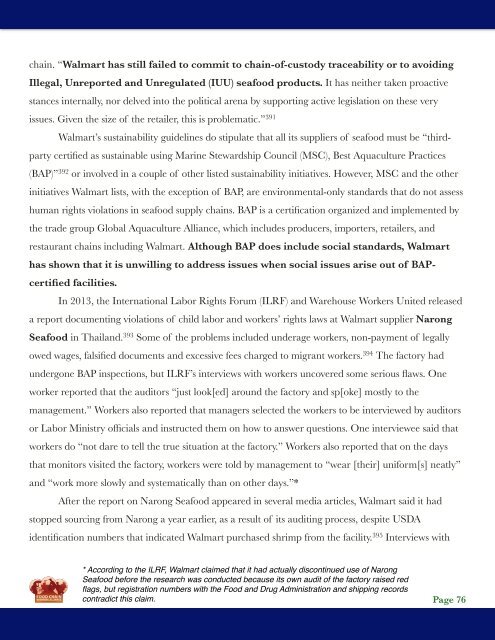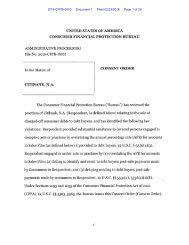Walmart-at-the-Crossroads-FINAL-06.04.15
Walmart-at-the-Crossroads-FINAL-06.04.15
Walmart-at-the-Crossroads-FINAL-06.04.15
You also want an ePaper? Increase the reach of your titles
YUMPU automatically turns print PDFs into web optimized ePapers that Google loves.
chain. “<strong>Walmart</strong> has still failed to commit to chain-of-custody traceability or to avoiding<br />
Illegal, Unreported and Unregul<strong>at</strong>ed (IUU) seafood products. It has nei<strong>the</strong>r taken proactive<br />
stances internally, nor delved into <strong>the</strong> political arena by supporting active legisl<strong>at</strong>ion on <strong>the</strong>se very<br />
issues. Given <strong>the</strong> size of <strong>the</strong> retailer, this is problem<strong>at</strong>ic.”<br />
391<br />
<strong>Walmart</strong>’s sustainability guidelines do stipul<strong>at</strong>e th<strong>at</strong> all its suppliers of seafood must be “thirdparty<br />
certified as sustainable using Marine Stewardship Council (MSC), Best Aquaculture Practices<br />
(BAP)”<br />
392<br />
or involved in a couple of o<strong>the</strong>r listed sustainability initi<strong>at</strong>ives. However, MSC and <strong>the</strong> o<strong>the</strong>r<br />
initi<strong>at</strong>ives <strong>Walmart</strong> lists, with <strong>the</strong> exception of BAP, are environmental-only standards th<strong>at</strong> do not assess<br />
human rights viol<strong>at</strong>ions in seafood supply chains. BAP is a certific<strong>at</strong>ion organized and implemented by<br />
<strong>the</strong> trade group Global Aquaculture Alliance, which includes producers, importers, retailers, and<br />
restaurant chains including <strong>Walmart</strong>. Although BAP does include social standards, <strong>Walmart</strong><br />
has shown th<strong>at</strong> it is unwilling to address issues when social issues arise out of BAPcertified<br />
facilities.<br />
In 2013, <strong>the</strong> Intern<strong>at</strong>ional Labor Rights Forum (ILRF) and Warehouse Workers United released<br />
a report documenting viol<strong>at</strong>ions of child labor and workers’ rights laws <strong>at</strong> <strong>Walmart</strong> supplier Narong<br />
Seafood in Thailand.<br />
393<br />
Some of <strong>the</strong> problems included underage workers, non-payment of legally<br />
owed wages, falsified documents and excessive fees charged to migrant workers.<br />
394<br />
The factory had<br />
undergone BAP inspections, but ILRF’s interviews with workers uncovered some serious flaws. One<br />
worker reported th<strong>at</strong> <strong>the</strong> auditors “just look[ed] around <strong>the</strong> factory and sp[oke] mostly to <strong>the</strong><br />
management.” Workers also reported th<strong>at</strong> managers selected <strong>the</strong> workers to be interviewed by auditors<br />
or Labor Ministry officials and instructed <strong>the</strong>m on how to answer questions. One interviewee said th<strong>at</strong><br />
workers do “not dare to tell <strong>the</strong> true situ<strong>at</strong>ion <strong>at</strong> <strong>the</strong> factory.” Workers also reported th<strong>at</strong> on <strong>the</strong> days<br />
th<strong>at</strong> monitors visited <strong>the</strong> factory, workers were told by management to “wear [<strong>the</strong>ir] uniform[s] ne<strong>at</strong>ly”<br />
and “work more slowly and system<strong>at</strong>ically than on o<strong>the</strong>r days.”*<br />
After <strong>the</strong> report on Narong Seafood appeared in several media articles, <strong>Walmart</strong> said it had<br />
stopped sourcing from Narong a year earlier, as a result of its auditing process, despite USDA<br />
identific<strong>at</strong>ion numbers th<strong>at</strong> indic<strong>at</strong>ed <strong>Walmart</strong> purchased shrimp from <strong>the</strong> facility.<br />
395<br />
Interviews with<br />
* According to <strong>the</strong> ILRF, <strong>Walmart</strong> claimed th<strong>at</strong> it had actually discontinued use of Narong<br />
Seafood before <strong>the</strong> research was conducted because its own audit of <strong>the</strong> factory raised red<br />
flags, but registr<strong>at</strong>ion numbers with <strong>the</strong> Food and Drug Administr<strong>at</strong>ion and shipping records<br />
contradict this claim.<br />
Page !76



